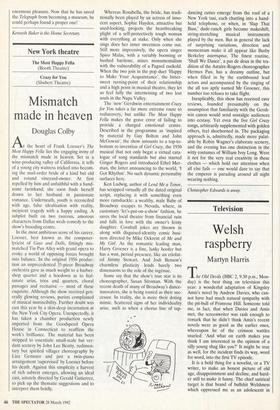New York theatre
Crazy for You (Shubert Theatre)
Mismatch made in heaven
Douglas Colby
At the heart of Frank Loesser's The Most Happy Fella lies the engaging irony of the mismatch made in heaven. Set in a wine-producing valley of California, it tells of a young city waitress tricked into becom- ing the mail-order bride of a kind but old and rotund vineyard-owner. At first repelled by him and unfaithful with a hand- some farmhand, she soon finds herself drawn to her husband in passionate romance. Underneath, youth is reconciled with age, false idealisation with reality, incipient tragedy with a happy ending. A subplot built on two raucous, amorous characters from Dallas weds comedy to the show's brooding centre.
In the most ambitious score of his career, Loesser, best known as the composer- lyricist of Guys and Dolls, fittingly mis- matched Tin Pan Alley with grand opera to evoke a world of opposing forces brought into balance. In the original 1956 produc- tion an unprecedented 35-piece Broadway orchestra gave as much weight to a barber- shop quartet and a hoedown as to Ital- ianate arias, trios and quartets, choral passages and recitative — most of these exquisite. Although the show received gen- erally glowing reviews, purists complained of musical immiscibility. Further doubt was cast this year by a skin-deep incarnation at the New York City Opera. Unexpectedly, it has taken a chamber production newly imported from the Goodspeed Opera House in Connecticut to reaffirm the work's brilliance. The material has been stripped to essentials: small-scale but ver- dant scenery by John Lee Beatty, rudimen- tary but spirited villager choreography by Liza Gennaro and just a twin-piano arrangement `supervised' by Loesser before his death. Against this simplicity a harvest of rich subtext emerges, allowing an ideal cast, astutely directed by Gerald Gutierrez, to pick up the thematic suggestions and to interpret them boldly. Whereas Rosabella, the bride, has tradi- tionally been played by an actress of inno- cent aspect, Sophie Hayden, attractive but used-looking, projects the heartbreaking plight of a self-protectively tough woman with everything at stake. Only when she sings does her inner sweetness come out. Still more impressively, the opera singer Spiro Malas, with a variably booming or hushed baritone, mixes monumentalism with the vulnerability of a Pagnol cuckold. When the two join in the pop duet 'Happy to Make Your Acquaintance', the bitter- sweet turning-point of their relationship and a high point in musical theatre, they let us feel fully the intertwining of two lost souls in the Napa Valley.
The 'new' Gershwin entertainment Crazy for You takes a far more extreme route to rediscovery, but unlike The Most Happy Fella makes the grave error of failing to provide a charged emotional centre. Described in the programme as 'inspired by material by Guy Bolton and John McGowan', the show amounts to a top-to- bottom re-invention of Girl Crazy, the 1930 musical that not only begat a virtual cata- logue of song standards but also starred Ginger Rogers and introduced Ethel Mer- man, the latter announcing to the world, 'I Got Rhythm'. No such dynamic personality surfaces here.
Ken Ludwig, author of Lend Me a Tenor, has scrapped virtually all the dated original script, replacing it with something even more ramshackle: a wealthy, male Babe of Broadway escapes to Nevada, where, in customary 'let's-put-on-a-show' fashion, he saves the local theatre from financial ruin and falls in love with the owner's feisty daughter. Cornball jokes are thrown in along with disguised-identity comic busi- ness directed by Mike Ockrent of Me and My Girl. As the romantic leading man, Harry Groener is a fine, lanky hoofer but has a wan, period presence, like an etiolat- ed Jimmy Stewart. And Jodi Benson's charmless plasticity lends barely two dimensions to the role of the ingenue.
Some say that the show's true star is its choreographer, Susan Stroman. With the recent death of many of Broadway's dance- innovators, she is being touted as their suc- cessor. In reality, she is more their doting mimic. Scattered signs of her individuality arise, such as when a chorus line of tap-
dancing cuties emerge from the roof of a New York taxi, each chatting into a hand- held telephone, or when, in 'Slap That Bass,' dude-ranch girls become makeshift, string-stretching musical instruments played by the men. But in general the lack of surprising variations, direction and momentum make it all appear like Busby Berkeley interruptus. The finest routine, 'Shall We Dance', a pas de deux in the tra- dition of the Astaire-Rogers choreographer Hermes Pan, has a dreamy outline, but when filled in by the earthbound lead actors and accompanied by the singing of the all too aptly named Mr Groener, this number too refuses to take flight.
Inexplicably, this show has received rave reviews, founded presumably on the assumption that familiarity with the Gersh- win canon would send nostalgic audiences into ecstasy. Yet even the five Girl Crazy songs, arbitrarily supplemented with golden others, feel shoehorned in. The packaging approach is, admittedly, made more palat- able by Robin Wagner's elaborate scenery, and the evening has one distinction in the witty costumes of William Ivey Long. Were it not for the very real creativity in these clothes — which hold our attention when all else fails — one would dare to say that the emperor is parading around all night wearing nothing.


























































 Previous page
Previous page